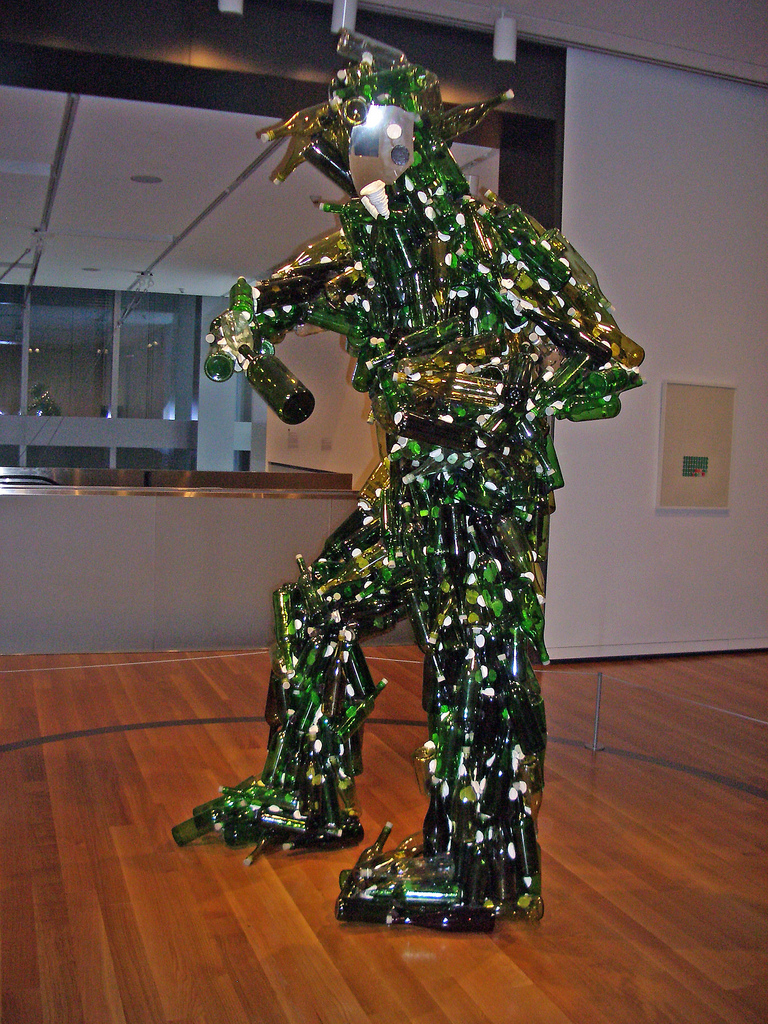The Bottle Hoax August 27, 2012
Author: Beach Combing | in : Modern , trackbackA cute story that belongs to the please-let-it-be-true category of human endeavour.
The Duke of Montague being in company with some other noblemen, proposed a wager, that let a man advertize to do the most impossible thing in the world, he would find fools enough in London to fill a playhouse, who would think him in earnest. ‘Surely,’ said Lord Chesterfield, ‘if a man should say that he would jump into a quart bottle, nobody would believe that!’ The Duke was somewhat staggered; but for the sake of the jest, determined to make the experiment.
Accordingly, it was advertized that the next day, (Jan. 10, 1749) a person would, at the Haymarket Theatre, ‘play on a common walking-cane the music of every instrument then used, to surprising perfection; that he would, on the stage, get into a tavern quart bottle, without equivocation, and while there, sing several songs, and suffer any spectator to handle the bottle; that if any spectator should come masked, he would, if requested, declare who he was; and that, in a private room, he would produce the representation of any person dead, with which the person requesting it should converse some minutes, as if alive.’ The prices of admission were gallery, 2s.; pit, 3s.; boxes, 5s.; stage. 1s. 6d.
The organisers were pushing their luck, which is never a good idea when a crowd is involved. And remember theatre-goers in the nineteenth-century were anything but the gentile season-ticket holders that you’ll find today, queuing politely on the pavements of the great metropolises of the west.
At night the house was crowded with curious people, many of them of the highest rank, including no less eminent a person than the Duke of Cumberland. They sat for a little while with tolerable patience, though uncheered with music; but by and by, the performer not appearing, signs of irritation were evinced. In answer to the continued noise of sticks and catcalls, a person belonging to the theatre came forward and explained that, in the event of a failure of performance, the money should be returned. A wag then cried out, that, if the ladies and gentlemen would give double prices, the conjuror would go into a pint bottle, which proved too much for the philosophy of the audience. A young gentleman threw a lighted candle upon the stage, and a general charge upon that part of the house followed.
According to a private letter— it was written by a Scotch Jacobite lady — ‘Cumberland [hero or villain of Culloden] was the first that flew in a rage, and called to pull down the house he drew his sword, and was in such a rage, that somebody slipped in behind him and pulled the sword out of his hand, which was as much as to say, ‘Fools should not have chopping sticks.’ This sword of his has never been heard tell of, nor the person who took it. Thirty guineas of reward are offered for it. Monster of Nature, I am sure I wish he may never get it. ‘
The greater part of the audience made their way out of the theatre; some losing a cloak, others a hat, others a wig, and others, hat, wig, and sword also. One party, however, stayed in the house, in order to demolish the inside; when, the mob breaking in, they tore up the benches, broke to pieces the scenes, pulled down the boxes, in short dismantled the theatre entirely, carrying away the particulars above mentioned into the street, where they made a mighty bonfire: the curtain being hoisted in the middle of it by way of flag.
Other examples of hoaxes going badly awry: drbeachcombing AT yahoo DOT com



